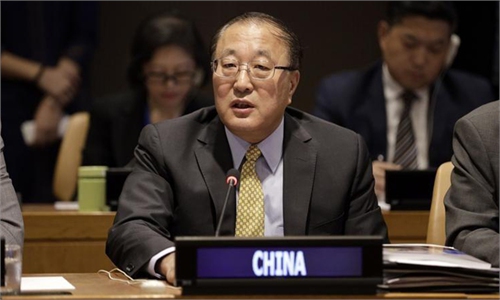
Illustration: Liu Rui/GT
Arkansas, a typically conservative and poor state, has become the first state in the US to force a Chinese-owned company to give up its ownership of local land. The 160 acres (0.65 square kilometers) of agricultural land, which may be even smaller than the manors or resorts owned by certain American magnates, has become the subject of hype by the Arkansas governor. This is another daily absurdity from American conservative politicians.On Tuesday local time, Arkansas ordered the Swiss-headquartered Syngenta, a leading agriculture company, to sell 160 acres of farmland in the US state within two years because the company is Chinese-owned. "This is about where your loyalties lie," Arkansas Governor Sarah Huckabee Sanders said at a news conference, stressing the company's "threat to our national security and to our farmers."
For some time, certain US states have been considering or enacting legislation to restrict Chinese purchases of American real estate or land. Arkansas apparently has gone further and taken action. The reason for the lack of practical move in other parts of the country is that, after all, how does farming harm US' national security exactly? So far, no convincing reason has been given. Moreover, Chinese interests are less than 1 percent of foreign-owned land, and the total amount of US agricultural land owned by Chinese interests is less than 0.03 percent.
Syngenta has its origins in Switzerland. It was acquired by ChemChina, a state-owned Chinese chemical company in 2017. The company has owned the site in Arkansas for 35 years. So what is the reason behind the sudden finger-pointing against Syngenta at this moment?
The mystery can be immediately solved through a Google News search on the governor, Sarah Huckabee Sanders, as the first articles that come up are all related to her recent scandal. For example, NPR reported on October 14 that Sanders's office is under fire for buying a $19,000 lectern. A whistleblower accused her office of covering up the expenditure and other reports say a group of Arkansas lawmakers ordered an audit to investigate the purchase. That explains why she is now vocally emphasizing the "China threat."
As a former White House press secretary during Donald Trump's presidency, Sanders knows all too well how to escape a scandal - whenever something bad happens, blame China, believing that screaming about China can offset the negative news surrounding her corruption charges. This is exactly what is happening in the Syngenta case, and it is a clear manifestation of the deteriorating political ecology in the US, Shen Yi, a professor at Fudan University, told the Global Times. Sanders is skilled at using rhetoric to make her words sound more appealing. For example, she claimed that "seeds are technology," connecting the 160 acres of farmland to the US-China tech war. Some experts believe that under the current political atmosphere in the US, it is indeed necessary to be vigilant against Arkansas' anti-China moves, as they could potentially lead to imitation and similar actions by other conservative US states.
States like Arkansas, which are becoming less and less competitive, and increasingly marginalized in the US, are inclined to adopt inexplicable reasons to restrict competition, especially through restrictions against Chinese companies. Their political leaders are also inclined to blame external factors, particularly China, for local backwardness, Lü Xiang, a research fellow at the Chinese Academy of Social Sciences, told the Global Times.
In the long run, a vicious circle has taken shape - local politicians become increasingly conservative and fatuous, and local development stagnates.
The rhetoric and policies of politicians like Sanders are not only undignified, but also expose their lack of confidence. More importantly, they deal a blow to the image and reputation of the US in global economic activities. Arkansas' latest move shows that the American investment environment is awful, completely driven by politics, and not worthy of trust. Worse, it proves that American politicians are incapable of driving local development, but are good at orchestrating political farces.


